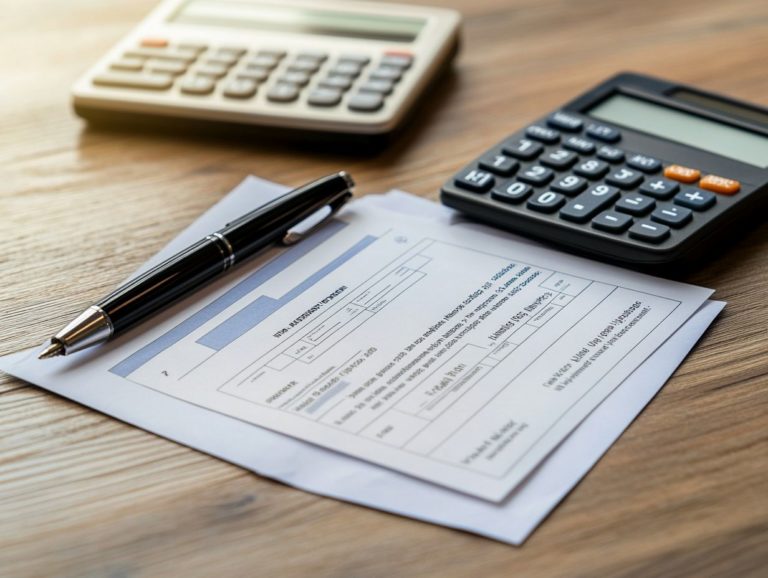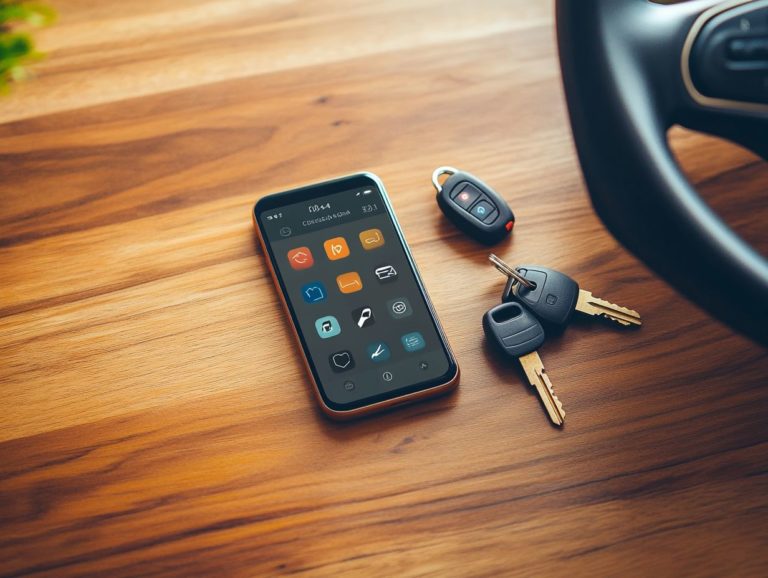The Impact of Down Payments on Car Financing
When it comes to financing a car, understanding down payments could save you thousands in the long run don’t miss this vital information. Grasping the concept of down payments is essential.
A down payment can greatly impact the overall cost of your vehicle, influencing everything from monthly payments to interest rates. While putting money down offers advantages like lower payments and more favorable loan terms, it also carries some drawbacks, such as the need for a higher upfront cost.
This article delves into what down payments are, examining their pros and cons, as well as the key factors to consider before making a decision. Additionally, it explores alternative financing options that you might find appealing.
Contents
- Key Takeaways:
- Understanding Down Payments in Car Financing
- Advantages of Making a Down Payment
- Disadvantages of Making a Down Payment
- Factors to Consider Before Making a Down Payment
- Alternatives to Making a Down Payment
- Frequently Asked Questions
- How does a down payment affect car financing?
- What is the ideal down payment for car financing?
- Can a larger down payment lower monthly car payments?
- What happens if I cannot afford a down payment?
- Are there any other benefits to making a down payment?
- Can I change my down payment amount after signing a financing agreement?
Key Takeaways:
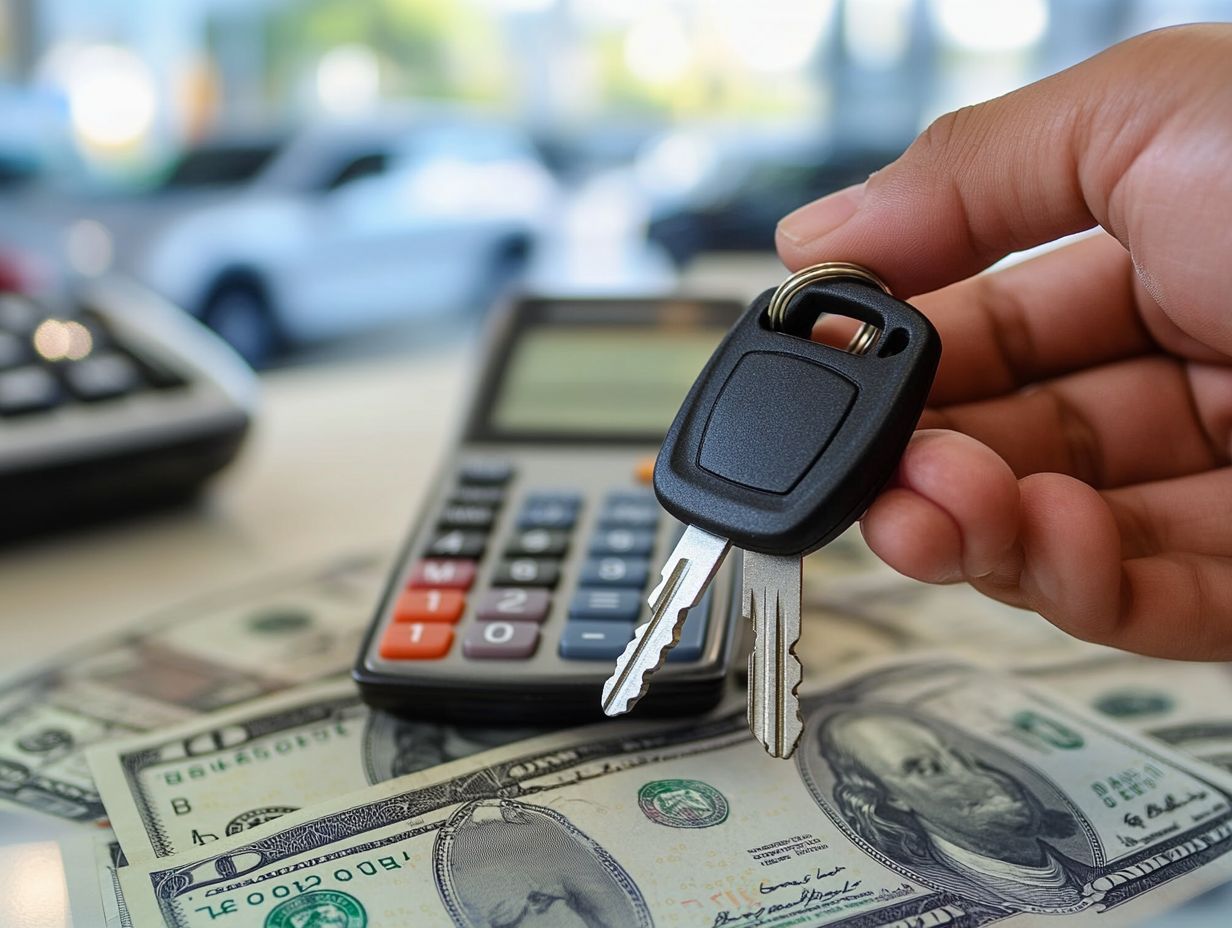
- A down payment can lower monthly payments, reduce interest rates, and improve loan terms for car financing.
- However, making a down payment also means higher upfront costs and potential loss of liquidity.
- Factors such as financial situation, loan terms, and vehicle depreciation should be considered before making a down payment. Alternatives like leasing or zero/low down payment options are also available.
Understanding Down Payments in Car Financing
Understanding down payments in car financing is essential as you navigate the intricacies of auto loans. A down payment acts as your initial financial commitment, influencing your credit score, interest rates, and overall financing options.
With vehicle prices on the rise, as highlighted by Kelley Blue Book and Greg McBride, making informed financial choices can greatly affect your equity in the car, your future monthly payments, and the policies of lenders.
A larger down payment can lead to lower interest rates, making it a critical part of your car ownership experience, as highlighted in the impact of interest rates on new car loans.
What is a Down Payment?
A down payment is the upfront sum you invest when purchasing a vehicle, playing a crucial role in influencing the loan amount for car and auto loans.
This initial investment is essential in the financing process; it directly reduces the total amount you need to finance, which ultimately translates to lower monthly payments. A significant down payment can also boost your creditworthiness, making it easier to secure more favorable financing terms, such as lower interest rates.
Industry reports indicate that average down payments typically hover between 10% to 20% of the vehicle s price, though various factors can influence this percentage. Elements like your credit history, the type of vehicle, and even current market trends can all significantly affect what constitutes an appropriate down payment for you.
Advantages of Making a Down Payment
Making a down payment offers numerous advantages that can significantly elevate your car financing experience. By doing so, you can enjoy lower monthly payments, reduced interest rates, and even gain a better understanding of the importance of credit score in car financing.
Ultimately, this strategy allows you to build equity in your vehicle more rapidly, positioning you for a more favorable financial journey.
Lower Monthly Payments
One of the primary benefits of making a down payment is the potential for significantly lower monthly payments on your auto loan. By contributing a larger sum upfront, you can decrease the overall loan amount, which ultimately reduces the interest paid over the life of the loan.
Consider this: if you were to finance a $30,000 vehicle, putting down 20% that s $6,000 means you re financing just $24,000. On the flip side, with a 10% down payment of $3,000, you re looking at financing $27,000. This seemingly small difference leads to noticeably smaller monthly obligations and impacts your total financing costs.
Over a five-year loan term, the individual financing $24,000 might find their monthly payments hovering around $450, while someone financing $27,000 could be shelling out closer to $500. This clearly illustrates the significant advantage of making a substantial down payment.
Ready to purchase your car? Start crunching the numbers on your down payment today to maximize your savings!
Reduced Interest Rates
A larger down payment can significantly reduce your interest rates. This ultimately saves you a considerable amount in interest over the life of your car loan.
This reduction can be particularly impactful. For example, putting down 20% instead of 10% could lower your interest rate by as much as 0.5%.
When you factor that into a typical five-year loan, you might end up saving hundreds, if not thousands, of dollars.
Your credit score greatly impacts your loan terms. Lenders are more likely to offer you favorable rates when they see a strong credit profile, often resulting in interest rates as low as 3% for those with excellent scores.
By understanding how these elements interact, you empower yourself to make informed financial decisions while highlighting the importance of effective credit management, which means keeping track of your credit score and paying bills on time.
Improved Loan Terms
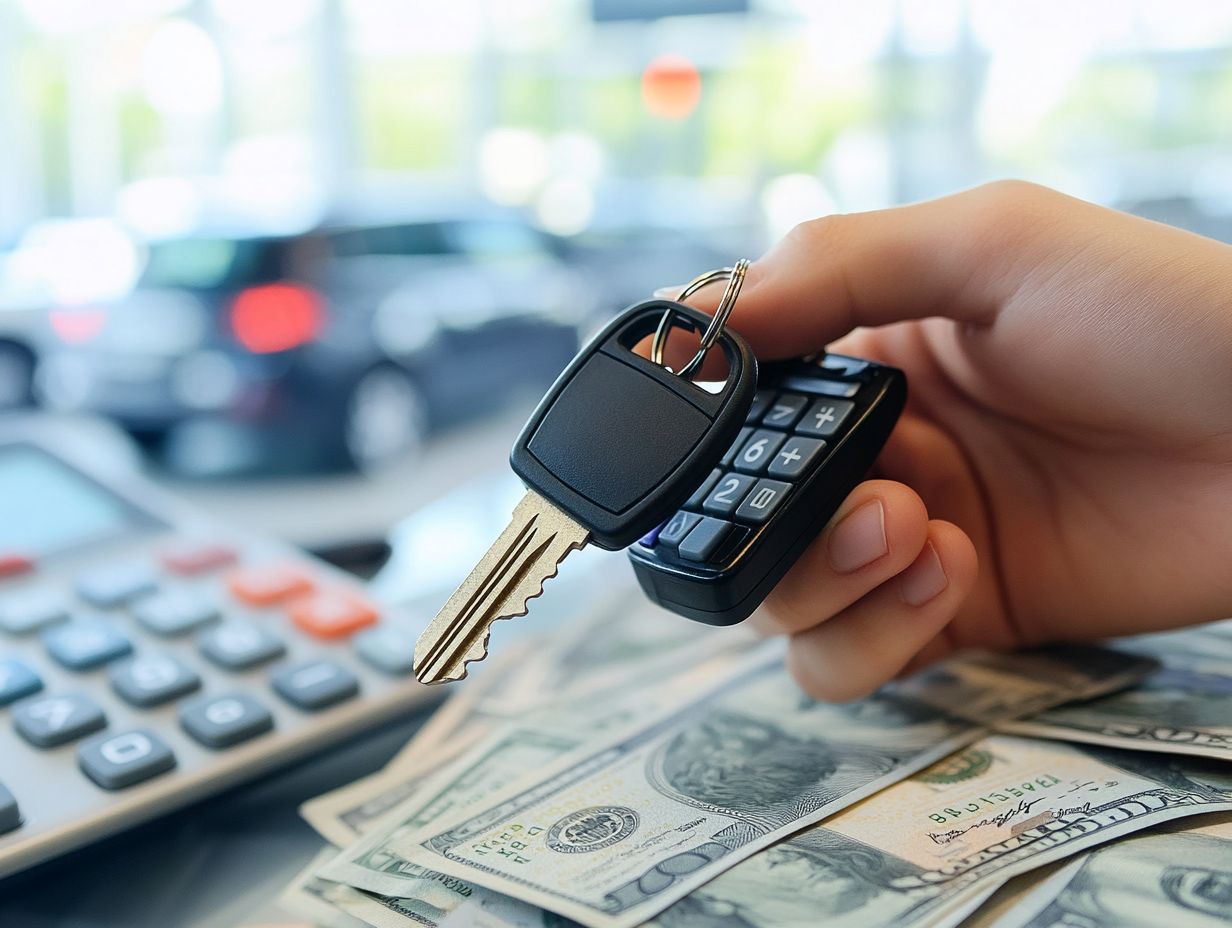
Making a substantial down payment can significantly enhance your loan terms. This offers you more favorable financing options and eases your money stress.
When you present a considerable down payment, lenders are typically more inclined to provide lower interest rates and extended repayment periods. This can greatly improve your overall financing experience.
Imagine saving money by choosing a shorter loan duration! With a better interest rate, your monthly payments decrease, alleviating financial strain and potentially freeing up cash for other investments.
Greater repayment flexibility allows you to choose a payment schedule that aligns perfectly with your income flow. This helps you avoid late fees and penalties.
Consider how a shorter loan duration can lead to less interest paid over time, ultimately boosting your financial health for the long haul.
Disadvantages of Making a Down Payment
While making a down payment has advantages, it s essential to weigh the potential disadvantages as well.
Higher upfront costs may strain your finances, and the resulting loss of liquidity could put your emergency savings at risk.
Think about how these factors could impact your overall financial stability before proceeding.
Higher Upfront Costs
One notable downside of making a down payment is the elevated upfront costs tied to purchasing a vehicle. This can strain your immediate finances.
This strain complicates your budget planning, as you need to factor in not just the initial payment but also how it fits into your overall financial stability.
You might find yourself reevaluating your car loan options as a result.
While a larger down payment can lead to smaller monthly payments, it demands a careful examination of your cash flow.
Such decisions can create ripples in other areas of your financial life. They can impact your spending habits, savings goals, and even your emergency funds.
Therefore, it s crucial to consider these factors thoughtfully before moving forward with a purchase.
Potential Loss of Liquidity
One significant drawback of making a down payment is the potential loss of liquidity. This can impact your ability to cover unexpected expenses or emergencies.
Without enough emergency savings, you could find yourself in a tough spot quickly. For example, if a sudden medical expense crops up or your car needs urgent repairs, you may be left scrambling for funds.
These situations highlight the importance of financial flexibility; lacking cash reserves can induce stress and limit your choices.
While a substantial down payment might lower your monthly mortgage payments, it could also deplete resources that are better allocated to creating a safety net.
Ultimately, grasping this balance is essential for maintaining your overall financial well-being.
Factors to Consider Before Making a Down Payment
Before you make that down payment, it’s crucial to weigh several factors, including your financial situation, the loan terms, interest rates, and the rate of vehicle depreciation.
Thinking through these factors empowers you to make a smart choice!
Your Financial Situation
Your financial situation is pivotal in determining the adequacy of a down payment. Key factors include your credit score and existing emergency savings.
When assessing the right amount for a down payment, it s essential to consider how these elements interconnect. A higher credit score often translates to more favorable mortgage rates. This allows you to minimize the overall cost of borrowing.
Having ample savings not only helps you make a larger down payment but also serves as a safety net for unexpected expenses that may arise during the home-buying journey.
This thoughtful balance ensures that you re focused not only on immediate acquisition costs but also on securing long-term financial stability.
Loan Terms and Interest Rates
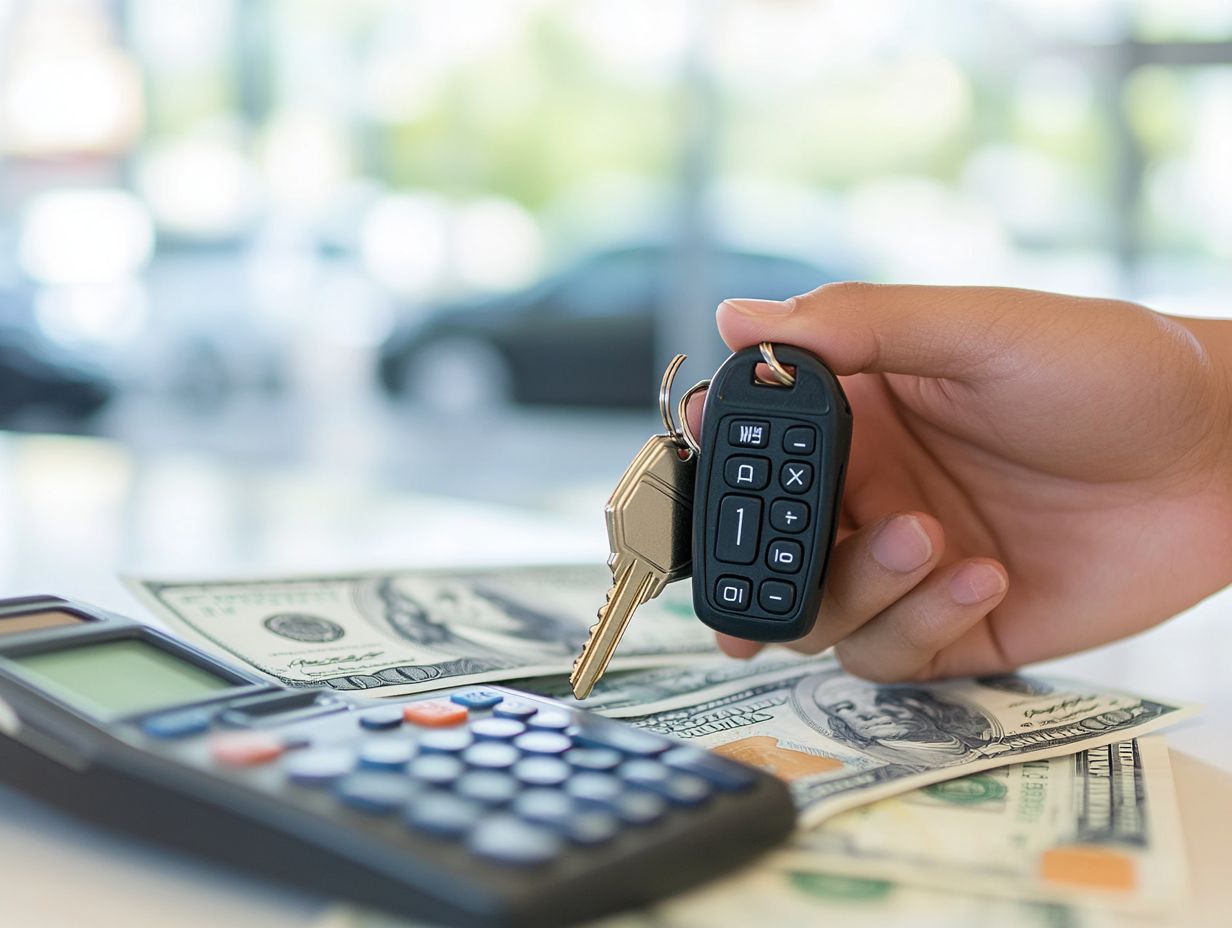
Understanding loan terms (the conditions of your loan) and interest rates is crucial when considering a down payment. These factors significantly impact your monthly payments and overall financing costs.
For example, choosing a shorter loan term usually means higher monthly payments, but it can lead to substantial savings on interest over the life of the loan. Conversely, longer loan terms may ease your monthly budget, yet they might increase the total interest paid by tens of thousands of dollars.
Data from various lenders shows that making a 20% down payment can significantly reduce the interest rate offered, making borrowing more affordable. This strategic financial move influences your immediate cash flow and lays the groundwork for greater equity accumulation in your property over time.
Vehicle Depreciation
Vehicle depreciation is a critical consideration when planning your down payment, as it directly impacts your equity in the car and the risk of negative equity.
This gradual decline in value can profoundly affect your loan terms and monthly payments. For example, if you purchase a vehicle valued at $30,000 and opt for a minimal down payment, you might quickly find yourself owing more than the car is worth just after leaving the dealership. This situation embodies negative equity.
Such a predicament complicates future trade-ins or sales and can lead to financial strain, especially if unexpected repairs or accidents arise. Therefore, it is crucial to make a substantial down payment to safeguard your equity and ensure a better financial position.
Alternatives to Making a Down Payment
If a down payment feels out of reach, don’t panic! There are exciting alternatives to explore. You might consider:
- Leasing a car
- Zero or low down payment options
These alternatives can still align beautifully with your financial strategy.
Leasing a Car
Leasing a car can be a smart alternative to making a hefty down payment. It often results in lower monthly payments than traditional financing options. This strategy is particularly advantageous if you enjoy the thrill of driving a new vehicle every few years without the long-term financial commitment of ownership.
While leasing typically offers more manageable monthly payments, it does come with certain caveats, such as mileage restrictions and the necessity to keep the car in pristine condition to avoid additional fees at the lease’s end. Traditional financing may require a larger upfront cost due to the down payment, but it ultimately paves the way for ownership of the vehicle.
This route contributes to long-term equity and can lead to lower overall costs, especially if you plan to keep the car for many years.
Zero or Low Down Payment Options
Zero or low down payment options are becoming popular in car loans. They offer flexibility if you don’t have a large amount available upfront.
These financing options attract a variety of customers, especially those new to credit. For instance, as a young professional, you might find a lender accepting just a 1% down payment.
These terms can simplify your buying process. However, remain vigilant, as lenders may offer lower initial payments but charge higher interest rates or extended loan terms.
Frequently Asked Questions
How does a down payment affect car financing?
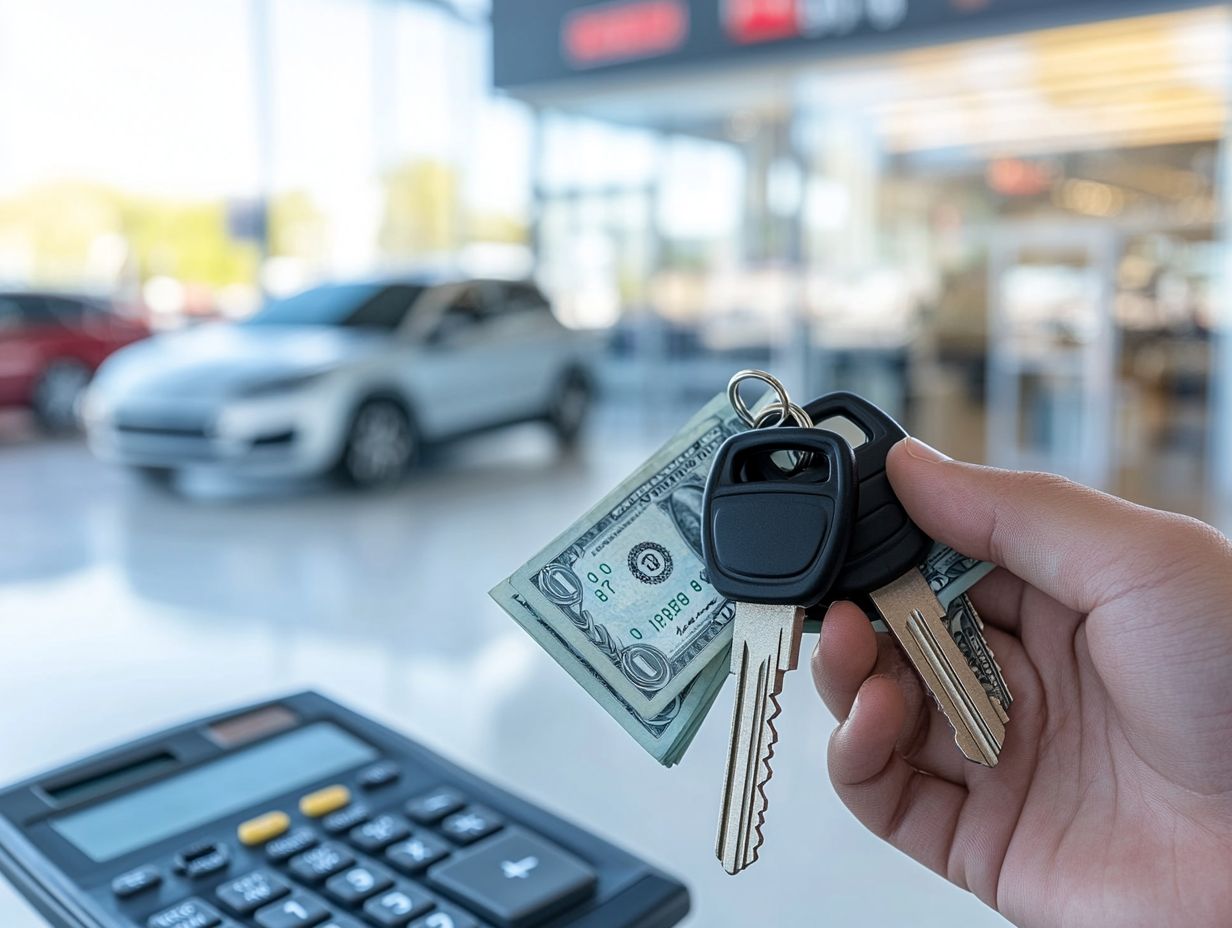
A down payment is the initial money paid when purchasing a car. It affects the overall cost and terms of your financing agreement.
What is the ideal down payment for car financing?
The ideal down payment varies based on your financial situation. A common guideline is to aim for at least 20% of the car’s total cost.
Can a larger down payment lower monthly car payments?
Yes! A larger down payment reduces the amount you finance, leading to lower monthly payments and potential savings on interest.
What happens if I cannot afford a down payment?
If a down payment is unaffordable, you can still finance a car. However, expect higher monthly payments and more interest over time.
Are there any other benefits to making a down payment?
Making a down payment can improve your chances of loan approval. It shows lenders you’re committed and responsible with your finances.
Can I change my down payment amount after signing a financing agreement?
Changing your down payment after signing is not advisable as it may alter your contract terms. Some lenders might allow changes, so consult them first.
Consider exploring financing options or consulting a financial advisor to find the best terms for your situation!




